| Listing 1 - 10 of 17 | << page >> |
Sort by
|
Book
ISBN: 0670802522 Year: 1991 Publisher: London New York Victoria Viking
Abstract | Keywords | Export | Availability | Bookmark
 Loading...
Loading...Choose an application
- Reference Manager
- EndNote
- RefWorks (Direct export to RefWorks)
Book
ISSN: 11050837 ISBN: 9607100654 9789607100658 Year: 1993 Volume: 12 12 Publisher: Vasilopoulos Istorikes ekdosis St. D.
Abstract | Keywords | Export | Availability | Bookmark
 Loading...
Loading...Choose an application
- Reference Manager
- EndNote
- RefWorks (Direct export to RefWorks)

ISBN: 3774920044 9783774920040 Year: 1984 Volume: 3 Publisher: Bonn Habelt
Abstract | Keywords | Export | Availability | Bookmark
 Loading...
Loading...Choose an application
- Reference Manager
- EndNote
- RefWorks (Direct export to RefWorks)
Sociology, Military --- Byzantine Empire --- 949.5.02 --- -Military sociology --- Armed Forces --- Armies --- Peace --- War --- War and society --- Geschiedenis van Byzantium: Leo III tot Michael VI--(716-1057) --- Byzantine Empire. Stratos --- -Geschiedenis van Byzantium: Leo III tot Michael VI--(716-1057) --- 949.5.02 Geschiedenis van Byzantium: Leo III tot Michael VI--(716-1057) --- Military sociology --- Byzantine Empire. --- Sociology, Military - Byzantine Empire
Book
ISBN: 2859441700 2859448357 9782859441708 Year: 2015 Volume: 10 Publisher: Paris : Éditions de la Sorbonne,
Abstract | Keywords | Export | Availability | Bookmark
 Loading...
Loading...Choose an application
- Reference Manager
- EndNote
- RefWorks (Direct export to RefWorks)
La brillante civilisation urbaine byzantine tire ses moyens d'existence des campagnes ; alors que les villes, face aux invasions, se replient derrière leurs murailles, le village devient un élément décisif de la société byzantine. Michel Kaplan a tenté de reconstituer la vie rurale de cette époque (vie-xie siècle) où Byzance surmonte le choc des invasions pour redevenir une grande puissance. Pour cette période mal dotée en documents d'archives, il a exploité systématiquement l'hagiographie, mais aussi les résultats de l'archéologie dans les Balkans, en Asie Mineure et en Syrie, la sigillographie et les enluminures des manuscrits. Il propose ainsi d'abord une description des constantes de la vie rurale byzantine (productions, pratiques agraires, habitat et terroir) ; puis il montre l'émergence de la société villageoise byzantine et de ses institutions, notamment la communauté villageoise, au-delà de son simple aspect fiscal ; ensuite, il reconstitue l'ascension des puissants qui aboutit à la crise de la petite paysannerie, que tente de résoudre la politique de la dynastie macédonienne ; enfin, recherchant les mécanismes de l'économie rurale byzantine, il étudie l'impact des facteurs conjoncturels, tente de définir le fonctionnement de l'exploitation paysanne, cellule de base de la production agricole, pour rechercher une explication au « blocage » de la société byzantine qui caractérise le xie siècle.
Byzantine Empire --- Empire byzantin --- History --- Rural conditions --- Histoire --- Conditions rurales --- 949.5.02 --- Geschiedenis van Byzantium: Leo III tot Michael VI--(716-1057) --- 949.5.02 Geschiedenis van Byzantium: Leo III tot Michael VI--(716-1057) --- Rural conditions. --- Economics (General) --- agriculture --- propriété agricole --- vie rurale --- paysannerie --- économie --- conditions rurales --- élite --- conditions économiques --- tenure
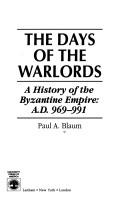
ISBN: 0819196568 0819196576 Year: 1994 Publisher: Lanham University press of America
Abstract | Keywords | Export | Availability | Bookmark
 Loading...
Loading...Choose an application
- Reference Manager
- EndNote
- RefWorks (Direct export to RefWorks)
Byzantine Empire --- Empire byzantin --- History, Military --- History --- Histoire militaire --- Histoire --- 949.5.02 --- Geschiedenis van Byzantium: Leo III tot Michael VI--(716-1057) --- -History, Military --- -949.5.02 --- 949.5.02 Geschiedenis van Byzantium: Leo III tot Michael VI--(716-1057) --- -Byzantine Empire
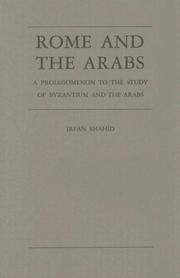
ISBN: 0884021157 9780884021155 Year: 1984 Publisher: Washington (D.C.): Dumbarton Oaks research library and collection
Abstract | Keywords | Export | Availability | Bookmark
 Loading...
Loading...Choose an application
- Reference Manager
- EndNote
- RefWorks (Direct export to RefWorks)
Arabs --- Arabes --- History --- Histoire --- Rome --- Middle East --- Moyen-Orient --- 949.5.02 --- -Arabs --- -Ethnology --- Semites --- North Africans --- Geschiedenis van Byzantium: Leo III tot Michael VI--(716-1057) --- -Middle East --- Asia, South West --- Asia, Southwest --- Asia, Western --- East (Middle East) --- Eastern Mediterranean --- Fertile Crescent --- Levant --- Mediterranean Region, Eastern --- Mideast --- Near East --- Northern Tier (Middle East) --- South West Asia --- Southwest Asia --- Orient --- -History --- -949.5.02 --- -Geschiedenis van Byzantium: Leo III tot Michael VI--(716-1057) --- 949.5.02 Geschiedenis van Byzantium: Leo III tot Michael VI--(716-1057) --- -949.5.02 Geschiedenis van Byzantium: Leo III tot Michael VI--(716-1057) --- Ethnology --- Arab countries --- Arabs - History - To 622 --- Arabs - Rome --- Rome - History - Empire, 30 B.C.-476 A.D. --- Middle East - History - To 622
Book
ISBN: 9025609929 9789025609924 Year: 1992 Publisher: Amsterdam Hakkert
Abstract | Keywords | Export | Availability | Bookmark
 Loading...
Loading...Choose an application
- Reference Manager
- EndNote
- RefWorks (Direct export to RefWorks)
Byzantine Empire --- History --- Provinces --- 949.5.02 --- 949.5.03 --- Geschiedenis van Byzantium: Leo III tot Michael VI--(716-1057) --- Geschiedenis van Byzantium: Isaac I - Latijnse verovering--(1057-1204) --- -History --- -Provinces --- 949.5.03 Geschiedenis van Byzantium: Isaac I - Latijnse verovering--(1057-1204) --- 949.5.02 Geschiedenis van Byzantium: Leo III tot Michael VI--(716-1057) --- Byzantium (Empire) --- Vizantii︠a︡ --- Bajo Imperio --- Bizancjum --- Byzantinē Autokratoria --- Vyzantinon Kratos --- Vyzantinē Autokratoria --- Impero bizantino --- Bizantia --- History. --- Byzantine Empire - History --- Byzantine Empire - Provinces - History
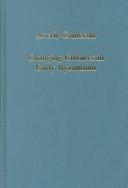
Abstract | Keywords | Export | Availability | Bookmark
 Loading...
Loading...Choose an application
- Reference Manager
- EndNote
- RefWorks (Direct export to RefWorks)
Offprints --- 949.5.02 --- Acculturation --- -Acculturation --- -Church history --- -Christianity --- Ecclesiastical history --- History, Church --- History, Ecclesiastical --- History --- Christianity --- Culture contact --- Development education --- Civilization --- Culture --- Ethnology --- Assimilation (Sociology) --- Cultural fusion --- Geschiedenis van Byzantium: Leo III tot Michael VI--(716-1057) --- Africa, North --- -Byzantine Empire --- -Barbary States --- Maghreb --- Maghrib --- North Africa --- Church history --- -Geschiedenis van Byzantium: Leo III tot Michael VI--(716-1057) --- -Civilization --- -Offprints --- 949.5.02 Geschiedenis van Byzantium: Leo III tot Michael VI--(716-1057) --- -949.5.02 --- -Byzantium (Empire) --- Vizantii︠a︡ --- Bajo Imperio --- Bizancjum --- Byzantinē Autokratoria --- Vyzantinon Kratos --- Vyzantinē Autokratoria --- Impero bizantino --- Bizantia --- Barbary States --- Middle Ages, 600-1500 --- Byzantine Empire --- Civilization. --- Church history. --- 527-1081 --- Africa [North ] --- Middle Ages, 500-1500 --- Culture contact (Acculturation)
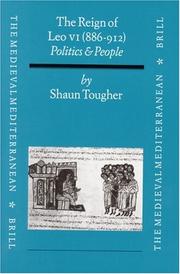
ISSN: 09285520 ISBN: 9004108114 9004477586 9789004108110 9789004477582 Year: 1997 Volume: v. 15 Publisher: Leiden New York Brill
Abstract | Keywords | Export | Availability | Bookmark
 Loading...
Loading...Choose an application
- Reference Manager
- EndNote
- RefWorks (Direct export to RefWorks)
The focus of this book is the Byzantine emperor Leo VI (886-912) and his reign. He has been characterised as a careless and ineffectual emperor, but this work presents a more considered account of Leo and the politics of his age. Initial chapters on sources and the broader historical context are provided before particular aspects of Leo's life and reign are presented in eight chapters, arranged so as to give a rough chronological framework. Subjects discussed include relations with family and officials, imperial ideology, and ecclesiastical and military affairs. By drawing on a broad spectrum of primary evidence the book illustrates that Leo forged a distinctive imperial style as a literate city-based non-campaigning emperor, and argues that he was actively concerned about the problems that faced his empire.
Leo --- Byzantine Empire --- Empire byzantin --- Kings and rulers --- History --- Rois et souverains --- Histoire --- Middle Ages. --- 949.5.02 --- Middle Ages --- Dark Ages --- History, Medieval --- Medieval history --- Medieval period --- World history, Medieval --- World history --- Civilization, Medieval --- Medievalism --- Renaissance --- Geschiedenis van Byzantium: Leo III tot Michael VI--(716-1057) --- Leo VI, Emperor of the East --- -History --- -Middle Ages. --- -949.5.02 --- 949.5.02 Geschiedenis van Byzantium: Leo III tot Michael VI--(716-1057) --- -Leo --- Leo, --- Leon --- Leon, --- Leone --- Leone, --- Leōn, --- Leōn --- Autokratōr Leōn --- Byzantine Empire - History - Leo VI, 886-911. --- Léon VI le Sage --- Emperors
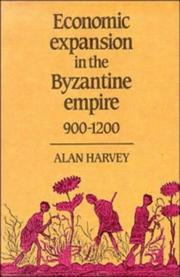
ISBN: 0521371511 0521521904 0511562438 9780521371513 Year: 1989 Publisher: Cambridge : Cambridge University Press,
Abstract | Keywords | Export | Availability | Bookmark
 Loading...
Loading...Choose an application
- Reference Manager
- EndNote
- RefWorks (Direct export to RefWorks)
In this book Dr Harvey shows that, if we broaden our comprehension of feudalism, the economic developments of the Byzantine Empire and of the medieval west were far more comparable than Byzantine historians have been prepared to admit. Previous interpretations have linked economic trends too closely to the political fortunes of the state, and have consequently regarded the twelfth century as a period of economic stagnation. Yet there is considerable evidence that the empire's population expanded steadily during the period covered by this book, and that agricultural production was intensified. A wealth of evidence serves to reinforce the point that the disintegration of the empire in the late twelfth century should no longer be associated with economic decline. Dr Harvey's conclusions, in particular that there is no incompatibility between the development of the landed wealth of a feudalising aristocracy and the growth of commerce and urbanisation, will affect all future interpretations of Byzantine history.
Byzantine Empire --- Empire byzantin --- Economic conditions --- Conditions économiques --- 949.5.02 --- 949.5.03 --- Geschiedenis van Byzantium: Leo III tot Michael VI--(716-1057) --- Geschiedenis van Byzantium: Isaac I - Latijnse verovering--(1057-1204) --- -Economic conditions --- 949.5.03 Geschiedenis van Byzantium: Isaac I - Latijnse verovering--(1057-1204) --- 949.5.02 Geschiedenis van Byzantium: Leo III tot Michael VI--(716-1057) --- Conditions économiques --- Byzantium (Empire) --- Vizantii︠a︡ --- Bajo Imperio --- Bizancjum --- Byzantinē Autokratoria --- Vyzantinon Kratos --- Vyzantinē Autokratoria --- Impero bizantino --- Bizantia --- Economic conditions. --- Arts and Humanities --- History --- Byzantine Empire - Economic conditions --- Finance --- History. --- Funding --- Funds --- Economics --- Currency question
| Listing 1 - 10 of 17 | << page >> |
Sort by
|

 Search
Search Feedback
Feedback About
About Help
Help News
News